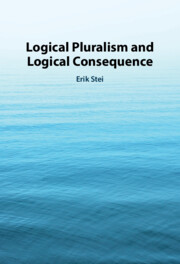Book contents
- Frontmatter
- Contents
- Figures
- Preface
- Chapter 1 Logical Pluralism Introduced
- Chapter 2 What Does It Mean for a Logic to Be Correct?
- Chapter 3 Three Dimensions of Plurality
- Chapter 4 The Cardinality of Logical Consequence
- Chapter 5 Domain Dependence
- Chapter 6 Pluralities of Meanings
- Chapter 7 Pluralism and Disagreement
- Chapter 8 Normativity and Collapse
- Chapter 9 Closing Remarks
- References
- Index
Chapter 3 - Three Dimensions of Plurality
Published online by Cambridge University Press: 23 March 2023
- Frontmatter
- Contents
- Figures
- Preface
- Chapter 1 Logical Pluralism Introduced
- Chapter 2 What Does It Mean for a Logic to Be Correct?
- Chapter 3 Three Dimensions of Plurality
- Chapter 4 The Cardinality of Logical Consequence
- Chapter 5 Domain Dependence
- Chapter 6 Pluralities of Meanings
- Chapter 7 Pluralism and Disagreement
- Chapter 8 Normativity and Collapse
- Chapter 9 Closing Remarks
- References
- Index
Summary
This chapter explores three dimensions on which logical plurality may arise. The first is concerned with the application of logic. Traditionally, logic was taken to be universally applicable in the sense that a deductively valid argument can be applied in any discourse or inquiry whatsoever. Some pluralists oppose that view by arguing that there are arguments which, though deductively valid, cannot be applied across the board. Deductive validity, on that view, is domain-dependent. The second dimension concerns semantics. Typically, if logics differ in their logical vocabulary, then they will draw the line between valid and invalid arguments in different ways. Even if the logical vocabulary of two logics is superficially the same, the sets of arguments the logics classify as valid may differ due to differences in the meaning of the logical vocabulary. The third dimension concerns the nature of validity. The most substantial kind of pluralism amounts to claiming that there is more than one extra-systematic relation that qualifies as a relation of logical consequence. The chapter outlines both the pluralist and the monist positions on those dimensions and identifies some core commitments.
Keywords
- Type
- Chapter
- Information
- Logical Pluralism and Logical Consequence , pp. 37 - 51Publisher: Cambridge University PressPrint publication year: 2023

